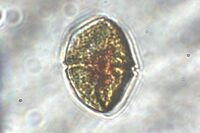Kryptoperidinium foliaceum: Difference between revisions
(→Author) |
|||
| Line 36: | Line 36: | ||
==Author== | ==Author== | ||
Page authored by | Page authored by Harini Sunder and Hunter Trier, students of Prof. Jay Lennon at Indiana University. | ||
<!-- Do not remove this line-->[[Category:Pages edited by students of Jay Lennon at Indiana University]] | <!-- Do not remove this line-->[[Category:Pages edited by students of Jay Lennon at Indiana University]] | ||
Revision as of 22:08, 25 April 2024
Classification
Eukaryota; Sar; Alveolata; Dinophyceae; Peridiniales; Kryptoperidiniaceae; Kryptoperidinium
[Others may be used. Use NCBI link to find]
Species
|
NCBI: Taxonomy |
Kryptoperidinium foliaceum
Description and Significance
The external appearnace of this microbe is with it having a round, imperfect circular shape. In color, it appears to be a golden brownish color. On the surface, there are many smaller circles, and important to note, there is an eyespot almost exactly in the center. The habitat of this species is typically marine environments, more specifically, areas with a hypersaline environment as Kryptoperidinium foliaceum thrive under saline conditions, although sometimes it can be found in costal areas and estuaries as well. In fact, Kryptoperidinium foliaceum was first discovered in a hypersaline environment in Kuwait. There was a direct correlation between the saline concentration and the Kryptoperidinium foliaceum population, the higher the saline concentration, the higher the population.
Genome Structure
Describe the size and content of the genome. How many chromosomes? Circular or linear? Other interesting features? What is known about its sequence?
Cell Structure, Metabolism and Life Cycle
Interesting features of cell structure; how it gains energy; what important molecules it produces.
Ecology and Pathogenesis
Habitat; symbiosis; biogeochemical significance; contributions to environment.
If relevant, how does this organism cause disease? Human, animal, plant hosts? Virulence factors, as well as patient symptoms.
References
Author
Page authored by Harini Sunder and Hunter Trier, students of Prof. Jay Lennon at Indiana University.

